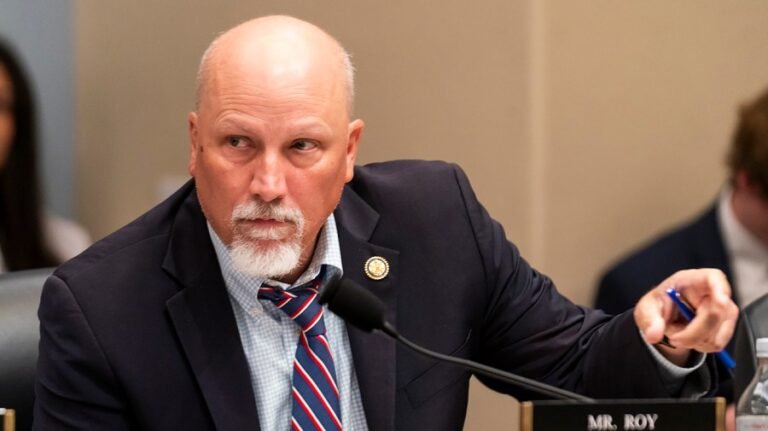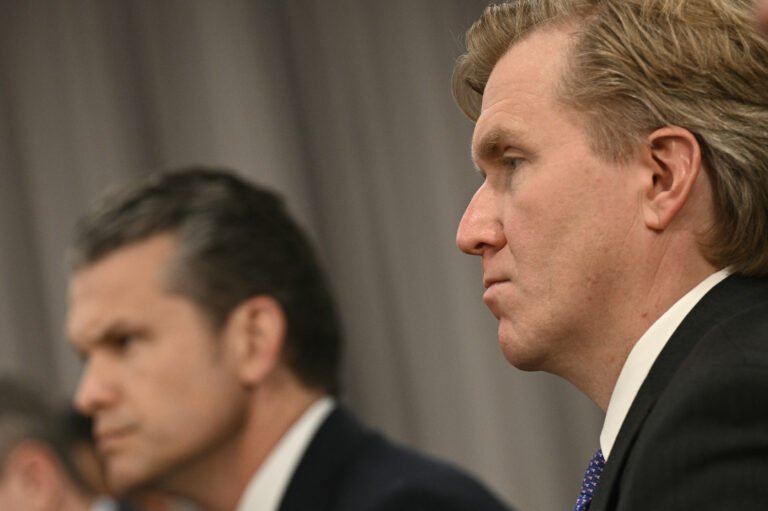
Morning Report is The Hill’s a.m. newsletter. Sign up here or using the box below:
In today’s issue:
- Johnson wrangles ‘big, beautiful’ votes
- Trump leans in on immigration message
- House Judiciary targets higher education
- Drones dominate Russia, Ukraine war
President Trump hailed the passage of the mammoth GOP budget bill as offering “something for everyone,” but the Senate legislation has landed with a thud among some House conservatives.
Many members of the lower chamber who have criticized the Senate’s version of Trump’s signature “big, beautiful bill” say their options now seem too few to fix it as the House takes up the legislation today.
Speaker Mike Johnson (R-La.) will be working uphill today to corral members, Rep. Marjorie Taylor Greene (R-Ga.) predicted in an interview Tuesday, describing the situation with the Senate bill as a “s—show.”
“I cannot imagine they have the votes,” she told Trump ally Steve Bannon by phone during his “War Room” podcast. “There is no way Johnson has the votes for this in the House.”
Rep. Andy Ogles (R-Tenn.) has called the Senate bill a “dud” that “guts key Trump provisions.”
Rep. Chip Roy (R-Texas) said the Senate’s treatment of clean energy tax credits is not aggressive enough and called it “a deal-killer of an already bad deal.”
Rep. Ralph Norman (R-S.C.) suggested the House should send the bill back to the Senate and leave town.
Rep. David Valadao (R-Calif.) said in a social media post over the weekend, “I’ve been clear from the start that I will not support a final reconciliation bill that makes harmful cuts to Medicaid.”
At least six House Republicans were a “no” as of early this week.
▪ The Hill: House GOP leaders scrambling to rally holdouts behind Trump megabill
▪ The Hill: House Rules Committee advances Trump megabill as potential GOP revolt looms
Valadao and Rep. Don Bacon (R-Neb.), who is retiring, wrote to the Speaker in April along with 10 colleagues stating they would not support any reconciliation legislation that cut Medicaid for their vulnerable constituents.
Johnson can only afford three defections if all members are present and voting on the bill, which the House passed by a one-vote margin in May.
The Speaker is pushing to heed Trump’s urging to get a bill to his desk by Friday, though acknowledged various complications, including major changes and weather impacting lawmakers getting to Washington.
“I’m not happy with what the Senate did to our product. We understand this is the process. It goes back and forth, and we’ll be working to get all of our members to yes,” Johnson told reporters Tuesday.
Even if the House sought to make changes and send the bill back to the Senate, the upper chamber left town Tuesday ahead of the July 4 holiday.
Johnson suggests his colleagues will have more options in the future, telling Fox News on Tuesday night that the House may consider two more budget reconciliation measures before the term ends in 2026.
“This is just a step in a sequence of events. We’re intending to do more reconciliation work,” he said, adding the House will rescind more previously appropriated spending and achieve additional savings through the appropriations process.
Trump took to social media to urge his party’s “occasional ‘GRANDSTANDERS'” to back down as the megabill heads to the House today, writing, “UNITED, have fun, and Vote ‘YAY.'”
House Minority Leader Hakeem Jeffries (D-N.Y.) said his caucus will work to try to slow the bill.
“All legislative tools and options are on the table,” he said, including the so-called magic minute, which allows House leaders to speak for an unlimited amount of time on the floor.
The president clinched a major victory Tuesday with the Senate advancing the measure in a 51-50 vote, made possible by Vice President Vance’s tiebreaking vote and a deal for Alaska’s rural health care in exchange for backing by the state’s Sen. Lisa Murkowski (R).
Three GOP senators ultimately voted against Trump’s agenda bill — Susan Collins (Maine), Rand Paul (Ky.) and Thom Tillis (N.C.) — following a rollercoaster all-nighter of Senate amendments and debate, with lawmakers working throughout Monday and into Tuesday morning.
Collins, 72, who said last month she intends to seek a sixth term next year but has not yet formally announced a campaign, objected to more than $1 trillion in Medicaid reductions and the repercussions for rural health providers.
Paul voted no after objecting for months to lifting the nation’s borrowing authority by $5 trillion as part of the gargantuan bill.
And Tillis, who announced he won’t seek reelection next year, was a “no” vote after warning his GOP colleagues that slicing into Medicaid to achieve savings to offset GOP-favored tax cuts would be a political mistake ahead of the 2026 elections.
▪ The Hill: Possible 2028 Democrats target Vance on GOP megabill tiebreaker
The Speaker is fielding loud objections from within his GOP ranks that the House version of Trump’s agenda is superior when it comes to cutting what conservatives call wasteful spending, fighting the nation’s $36 trillion debt and securing U.S. borders.
“I’ve tried to … indicate to [the House] when they were moving their bill over there that we were going to be as conservative — or more so — than they are,” Senate Majority Leader John Thune (R-S.D.) told Semafor during an interview. “And in the end, we did.”
The federal spending reductions in the sweeping Senate-passed bill amount to one of the largest retrenchments in the federal safety net in a generation. But the savings those cuts generate offset a fraction of the total cost of the bill, which is estimated by the nonpartisan Congressional Budget Office to add more than $3 trillion to the federal debt by 2034.
The measure would extend and expand tax cuts, shrink the federal investments in Medicaid and food benefits, and end tax credits tied to clean energy and overhaul student loans. CNBC unpacked where the Senate ended up on the expansion of the state and local tax deduction, a key provision among House GOP moderates who represent districts in high-tax states.
▪ The Hill: What made the cut in Senate’s nearly 1,000-page policy megabill?
▪ The Hill: Senate GOP measure dropped a wind and solar excise tax at the last minute.
Murkowski urged the House to try to improve what came out of the Senate on Tuesday. “Did I get everything that I wanted? Absolutely not,” she said.
“We do not have a perfect bill by any stretch of the imagination. My hope is that the House is going to look at this and recognize that we’re not there yet.”
SMART TAKE with BLAKE BURMAN
President Trump threatened to arrest Zohran Mamdani if the New York City Democratic mayoral candidate were to defy Immigration and Customs Enforcement. Mamdani responded by calling the statement “intimidation.” The underlying question remains, though: Will America’s largest city elect a self-proclaimed democratic socialist as mayor?
Scott Tranter, data science director at Decision Desk HQ, told me he thinks it’s probable.
“I think the bettors got it right on this one,” he told me, pointing to online betting markets that show Mamdani with good odds. “Now, I think there’s a lot of race to run, but that’s where it is.”
As Scott also notes, one thing to watch as Mamdani’s profile rises by the day is his fundraising, and specifically how much might head his way from outside of NYC.
Burman hosts “The Hill” weeknights, 6p/5c on NewsNation.
3 Things to Know Today
- The FBI is keeping its headquarters in D.C. The bureau will leave the crumbling Hoover Building and instead occupy space at the Ronald Reagan Building — recently home to the now-shuttered U.S. Agency for International Development.
- College students are increasingly relying on AI. How is it impacting their writing skills?
- The Department of Government Efficiency collected troves of sensitive data. It could reportedly help Elon Musk’s business interests.
Leading the Day
🐊 “ALLIGATOR ALCATRAZ”: Trump on Tuesday toured Florida’s new remote migrant detention facility in the Everglades, dubbed “Alligator Alcatraz,” which was built through a partnership of state and federal resources to bolster the president’s immigration crackdown. The president visited the facility with Homeland Security Secretary Kristi Noem and Florida Gov. Ron DeSantis (R). The soft-sided units outfitted with chain-link cells have been built to house hundreds of detainees.
In a video first coining the site “Alligator Alcatraz,” Florida Attorney General James Uthmeier (R), who joined Trump for Tuesday’s tour, highlighted its remote location as a bonus. Ahead of the tour, Trump advised would-be escapees to zigzag when trying to evade reptilian predators lurking in the Everglades.
“Don’t run in a straight line; run like this,” the president said to reporters, waving his hand from side to side. “You know what, your chances go up by 1 percent. Not a good thing.”
DENATURALIZATION: The Department of Justice in a memo laid out new guidelines encouraging its attorneys to seek to strip U.S. citizenship from those who have naturalized if they have committed various crimes. But the memo lists a number of other qualifying crimes, adding that attorneys can prioritize denaturalization even for those who are facing “pending criminal charges” that have not yet secured a conviction. The directive poses a risk to the nearly 25 million naturalized U.S. citizens, according to 2023 data.
“The provision is so vague that it would permit the Division to denaturalize for just about anything. It could be something prior to or following naturalization,” Joyce Vance, a law professor and former U.S. attorney appointed by former President Obama, wrote on her blog. “All are now vulnerable to the vagaries of an administration that has shown a preference for deporting people without due process and dealing with questions that come up after the fact and with a dismissive tone.”
▪ The Hill: New York City mayoral candidate Zohran Mamdani (D), who on Tuesday officially won the Democratic primary, slammed Trump’s threat to investigate his immigration status and arrest him over his opposition to U.S. Immigration and Customs Enforcement (ICE) raids. Mamdani is a naturalized U.S. citizen.
▪ CBS News: The Trump administration recently transferred migrant detainees from countries in Africa, Asia, Europe and the Caribbean to detention facilities at Guantánamo Bay.
As Trump ups his rhetoric against immigration, top White House officials are centering their closing message for the president’s mammoth policy bill on deportations and immigration enforcement.
“Republicans have spent generations promising Americans full, complete and total border security. And now it’s here, in this bill. This chance won’t come again,” Stephen Miller, White House deputy chief of staff for policy, posted on the social platform X.
While the bill faces several challenges among different factions of the House GOP, The Hill’s Emily Brooks reports that the argument from the White House is that the boost in funding to carry out Trump’s mass-deportation agenda trumps all those concerns.
“Everything else — the CBO score, the proper baseline, the minutiae of the Medicaid policy — is immaterial compared to the ICE money and immigration enforcement provisions,” Vice President Vance posted on X late Monday night.
To read more, click here to sign up for “The Movement,” Brooks’s weekly newsletter covering conservative politics.
When and Where
- The president has no public schedule.
- The House will convene at 9 a.m.
- The Senate will hold a pro forma session Thursday at noon.
Zoom In
HIGHER ED: The House Judiciary Committee on Tuesday issued a subpoena to the University of Pennsylvania and Brown University as part of its probe into alleged tuition coordination among Ivy League schools. The order marks the latest chapter in the GOP’s war on elite institutions of higher education.
The committee has jurisdiction to investigate “whether existing civil and criminal penalties and current antitrust law enforcement efforts are sufficient to deter anticompetitive practices among higher education institutions,” wrote House Judiciary Chair Jim Jordan (R-Ohio) and antitrust subcommittee Chair Scott Fitzgerald (R-Wis.).
Meanwhile, the shocking ouster of University of Virginia President James Ryan broadened the administration’s higher education battle to public universities. Ryan announced Friday he would be leaving the university after an apparent pressure campaign from the Trump administration over the school’s diversity, equity and inclusion policies that went largely undetected until it reached a boiling point. Ryan’s departure was a wake-up call for public universities that Trump’s focus is not exclusively on Ivy League universities, writes The Hill’s Lexi Lonas Cochran.
▪ The Hill: The University of Pennsylvania has agreed to ban transgender women from participating on its women’s sports teams and remove the records of Lia Thomas, a former student and the first transgender woman to win a NCAA Division I national championship.
▪ The Hill: The Trump administration says Harvard University is in “violent violation” of the Civil Rights Act due to inaction to protect Jewish students.
▪ NPR: On Monday, the Trump administration notified states it was withholding more than $6 billion in previously approved federal education grants to schools.
TRADE DEALS: As the July 9 tariff extension deadline fast approaches, most trade partners with the U.S. are still in limbo over their economic future as dozens of country-specific trade deals are still being worked out. Those include deals with a group of “key 18” countries, as designated by Treasury Secretary Scott Bessent.
While the White House is pursuing deals on a country-by-country basis following the April 2 launch of novel “reciprocal” tariffs, deals could also be combined into regional agreements. Trade experts are emphasizing caution amid a negotiation process that has been marked by rapid-fire announcements and reversals.
“If there’s anything that I would have observed since April 2 and earlier in the year, it’s that the situation changes very quickly and on very short time horizons,” Willy Shih, a professor of business operations at the Harvard Business School, told The Hill’s Tobias Burns. “It looks like a China deal and maybe some of these other ones are coming in for a landing, but you never know.”
▪ Politico: The European Union is pushing to ease its tariff pain in a trade deal with Trump.
▪ The Wall Street Journal: Trump said trade deals would come easy. Japan is proving him wrong.
TRUMP VS. MUSK: A public and messy feud between Trump and tech billionaire Elon Musk reignited Monday over the president’s “big, beautiful bill.” Musk on social media vowed to back primary challengers against any Republicans who support Trump’s megabill and promised to donate to lawmakers who have drawn the administration’s ire, such as firebrand Rep. Thomas Massie (R-Ky.).
Trump responded by threatening to cut government contracts for Musk’s companies and left open the possibility of deporting the South African CEO. Trump and Musk both had signaled they were ready to move on from their bitter fight nearly a month ago, but the president’s megabill that Musk has called “political suicide for the Republican Party” has brought the two men back to snipping.
▪ CNBC: Tesla shares tumble after Trump says DOGE should look at Musk’s federal subsidies.
KEEPING AN EYE ON: Paramount Global, CBS’s parent company, said Tuesday it will settle a voter interference lawsuit filed by Trump last October for $16 million. Press freedom advocates have warned against the move, which will likely clear the way for Paramount to merge with Skydance Media.
Texas: Former Rep. Colin Allred (D) launched his campaign for Senate on Tuesday, making a second run at the upper chamber after failing to unseat Sen. Ted Cruz (R-Texas) last year.
Nebraska: Omaha City Council member Brinker Harding (R) launched a bid Tuesday for Rep. Don Bacon’s (R-Neb.) seat. Bacon announced Monday he plans to finish out his House term and not seek reelection next year, opening the door to what’s expected to be a competitive race in Nebraska’s 2nd Congressional District.
Elsewhere
UKRAINE: A Ukrainian drone struck a Russian industrial plant deep inside the country Tuesday, after Ukrainian President Volodymyr Zelensky prioritized the weapon’s development and Russia pounded Ukraine with a record number of drones in June. In the more than three-year war following Russia’s February 2022 invasion, both sides have raced to improve drone technology.
Meanwhile, French President Emmanuel Macron urged Russian President Vladimir Putin on Tuesday to agree to a ceasefire “as soon as possible” in the first phone call between the two leaders since 2022.
▪ The Hill: The Pentagon has halted shipments of some air defense missiles and munitions to Ukraine out of concern that U.S. weapons stockpiles have fallen too low.
▪ The New York Times: As ceasefire talks have flared and faltered, the battle for eastern Ukraine has only intensified.
GAZA: Trump said Tuesday that Israel has agreed to a proposal for a two-month ceasefire in its war with Hamas, ahead of a White House meeting on Monday with Israeli Prime Minister Benjamin Netanyahu. The president didn’t give any details on the deal, and it’s unclear whether Hamas will accept. Trump said Qatar and Egypt — who have previously helped mediate talks with Hamas — “will deliver this final proposal.”
The Israeli military acknowledged that civilians were harmed at aid distribution centers in Gaza, saying that Israeli forces had been issued new instructions following what it called “lessons learned.” Since Israel lifted an 11-week aid blockade on Gaza on May 19, allowing limited deliveries, the United Nations says more than 400 Palestinians have been killed while seeking aid.
On Tuesday, more than 40 people were killed in an Israeli airstrike that hit a cafe near the port in Gaza City.
▪ Time magazine: What to know about Trump’s Gaza ceasefire proposal.
▪ The New York Times: In an attack at sunset, Israelis set a Palestinian village ablaze. The violence last week in the occupied West Bank comes amid a surge in assaults by Israeli settlers.
Opinion
- We both served as Treasury Secretary. We know this bill is dangerous, by Robert E. Rubin and Lawrence H. Summers, guest essayists, The New York Times.
- Justice is coming for Putin, by Vladimir Kara-Murza, columnist, The Washington Post.
The Closer
And finally … On this day in 1964, President Lyndon B. Johnson signed the Civil Rights Act into law. The legislation — which outlawed discrimination based on race, color, religion, sex or national origin — was perhaps the most important U.S. law on civil rights since Reconstruction and is the hallmark document of the American Civil Rights Movement.
Click here for a timeline of the Civil Rights Movement, from Reconstruction to the 1960s.
Thanks for reading! Check out more newsletters from The Hill here. See you next time.


